Is This Suitible for Ducks Manna Pro Family Farm® Egg Maker 15 Layer Crumbles Chicken Feed
*This post may contain affiliate links, which means as an Amazon Associate I may receive a small percentage from qualifying purchases if you make a purchase using the links, at no additional cost*
---------------------------------------------------------
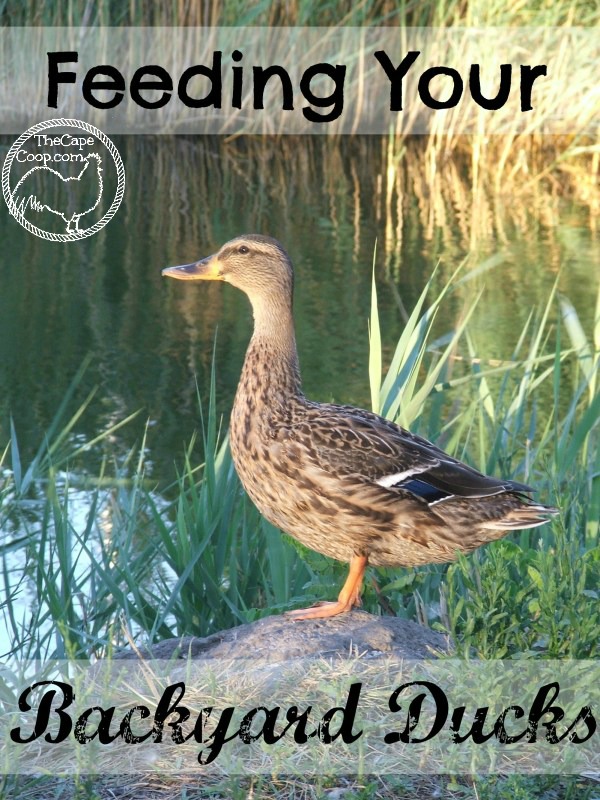
Before I brought my first ducks home, I was doing some research on the best food to feed them. My local feed store carries several kinds of chicken feed and a "mixed flock" feed, but nothing specifically for water fowl. Way more people keep chickens than they do ducks, so chicken feed is generally much easier to find.
I had tried the mixed flock feed once before with my chickens and was pretty unhappy with it. It was marketed for being good for chickens, ducks, geese & turkeys from babies to adult. Sounds like the perfect solution right? I didn't think so, at least not that brand. When my layer chickens were on the mixed flock feed there was a noticeable drop in egg production, and it is the only time we ever have seen the strange "no shell eggs".
This leads me to believe in an effort to provide nutrition for different age ranges and species it is shortchanging birds in some areas (or maybe it was just a bad brand, in either case it made me leary of trying it again). When we added ducks to our flock, I knew I didn't want to go back to the mixed flock feed. But in the absence of water fowl feed, what should we do? To save space and effort is it ok to just feed your ducks chicken layer feed?
Early Duckling Stage (0-2 weeks)
Even if you can find adult water fowl feed, it is even harder to find water fowl starter feed, so many people feed their ducklings chick starter. Ducklings grow much faster than chicks. To facilitate this fast growth, you want to be sure you are providing your ducklings with enough protein. Try to find a high protein chick starter (20-22% would be ideal) for those first two weeks if you can. High protein feed can be hard to find. At the very least, aim for one with 18%.
Because ducklings eat so much more than chicks, you want to find a non medicated chick starter. Ducklings will eat too much and can over medicate themselves. Chick feed is medicated to prevent coccidiosis, which is common among chickens, but pretty rare in ducks so the medication is unnecessary anyway.
The other consideration with feeding ducklings chick starter is the niacin levels. Ducklings require 2-3 times the amount of niacin that chicks need, deficiencies can lead to bowed legs and joint issues. An easy source of niacin is powdered brewer's yeast . Add 1.5 tablespoons of brewers yeast to every cup of chick feed. Click here to read more about ducklings & niacin
Always provide plenty of fresh water with the feed to help the ducklings digest their food, and hold off on additional treats at this time.
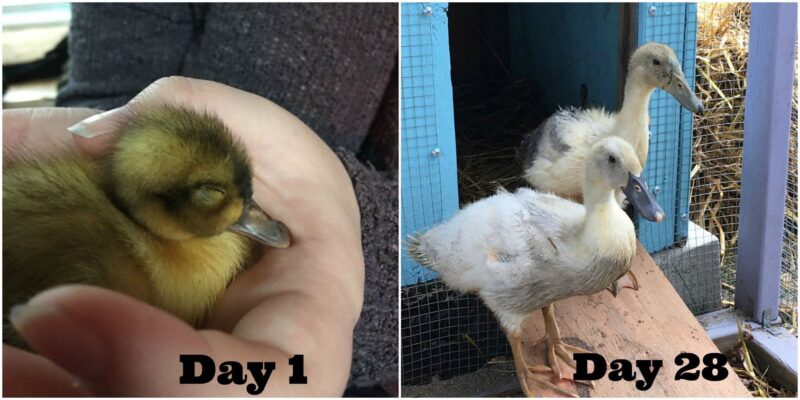
Later Duckling Stage (3-20 weeks)
Ducks grow fast. How fast? A typical Mallard duck at birth weighs 35 grams. By their one week birthday it will be about 100 grams and by the time they are two weeks old they will be about 250 grams. That is seven times bigger in just two weeks – imagine if your 7 pound newborn human baby grew to 50 pounds in just two weeks! Believe it or not at 3 weeks, your ducklings will kick their growth into even higher speed!
To avoid a protein overload, you can switch to a lower protein chick grower feed (16-18% protein, still non medicated). Grower feed tends to be easier to find than the high protein starter feed, but if you can't find a lower protein feed, you can "dilute" your starter feed with rolled oats. Mix in rolled oats, to replace up to 20% of your duckling's feed. Too much protein can cause a wing deformity known as Angel Wing. It causes the wing to stick out instead of laying flat against the body.
Continue to supplement your duckling's niacin intake with brewer's yeast until about 20 weeks, and of course continue providing plenty of fresh water.
As long as your ducklings have access to grit (sand or dirt) you can start to introduce treats to their diet. Don't go overboard, they should still be getting the majority of their nutrition from their feed.
Some good treats to try with later stage ducklings include scrambled eggs, yogurt or cottage cheese, earthworms or mealworms, soft mashed fruits like bananas, peaches or unsweetened applesauce, lettuce & herbs. Try tearing up romaine lettuce or fresh herbs and floating them in their water dish, they will go crazy for it! Greens (lettuce, herbs, grass, weeds, etc) can be fed in unrestricted amounts, but you should try to limit other treats to less than 10% of their diet.
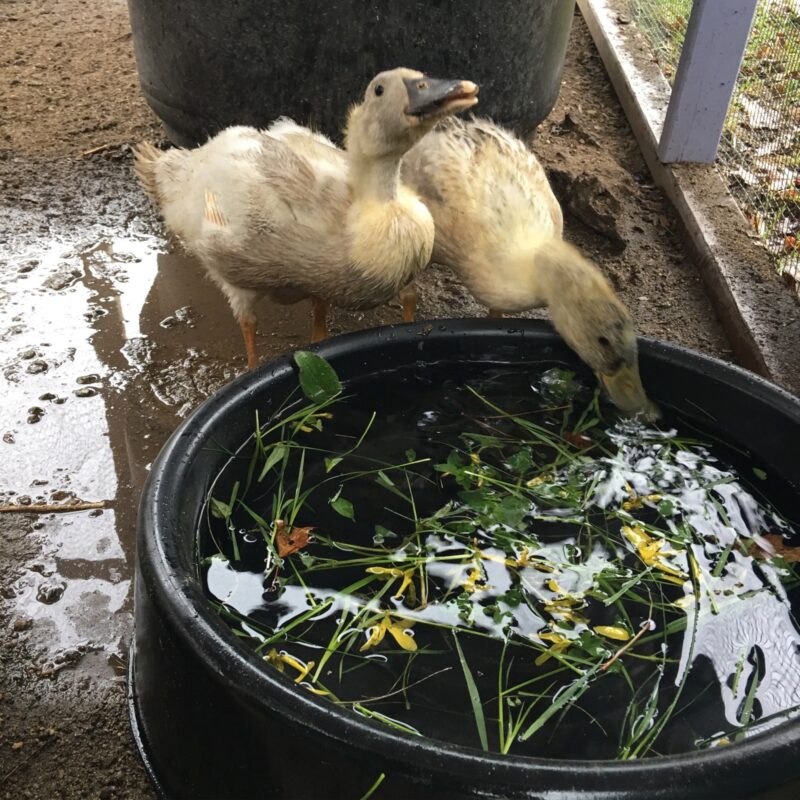
Adult Ducks (21 weeks+)
At this point, your duck is full grown and will be getting ready to lay her first egg. You want to switch over to regular chicken layer feed (or water fowl layer feed if you can find it). You won't need to supplement with the brewer's yeast anymore.
Quality layer feed should have at least 16% protein and added calcium to help form strong eggshells. If all your ducks are older and no longer laying, or if you are keeping drakes only, you can use a maintenance diet lower in protein (about 14%) and calcium if you want. It won't hurt drakes & senior hens to eat layer feed, but maintenance feed will help them keep a healthy weight.
Feed should be offered free choice throughout the day along with access to plenty of fresh, clean water. An adult duck can drink up to a half gallon of water every day, so make sure you are checking the water levels often. The feed bowl should be emptied and cleaned every day. Because ducks like to moisten their feed the food bowl often ends up with water in it. Wet food can get moldy, and you don't want your ducks to eat moldy food. If you have chickens, you will notice the list of treats ducks enjoy is pretty similar. Click here to read about treats to try with your duck. The following healthy treats can be offered free choice along with their feed:
*crushed oyster shells (great source of calcium for laying ducks)
*lettuce/greens (opt for darker greens like kale or romaine – but do not feed them spinach as this can effect their calcium absorption causing issues with laying and egg binding)
*herbs – toss some in their water or pool and watch them fish them out. Pretty much any fresh herb will be appreciated but some to try include oregano, parsley, basil, mint, sage, dill and marjoram
*weeds – only if your yard has not been treated with any chemicals please! Some favorites include dandelions (flowers & leaves), clover & chickweed
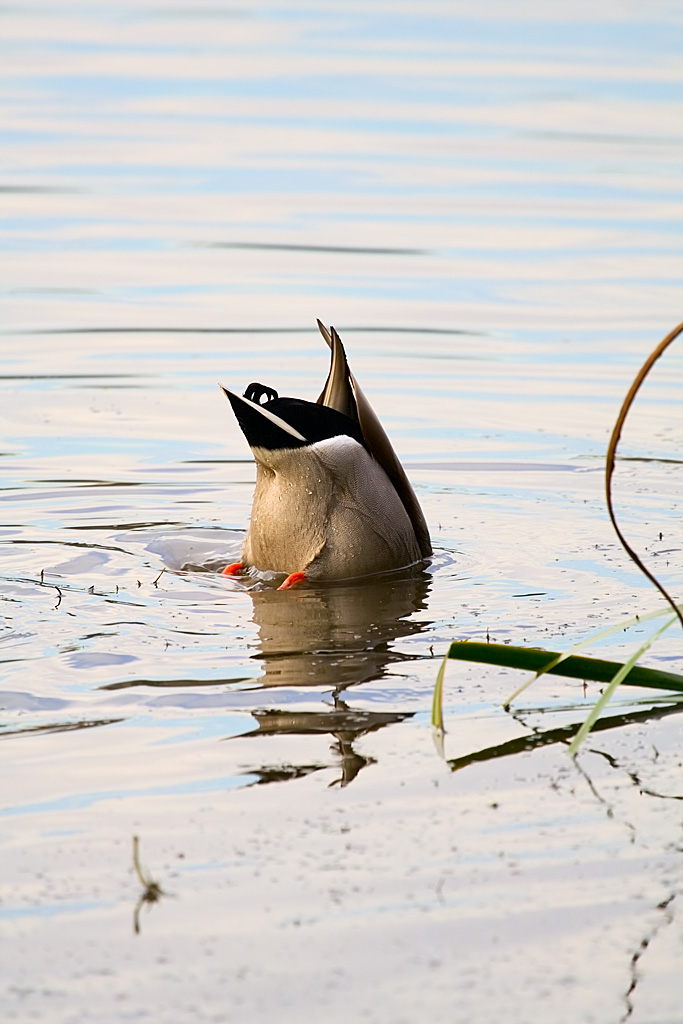
Other treats ducks love (limit to 10% of diet):
*bugs – fresh or dried, they seem to especially love slugs but also love earthworms, grubs, meal worms & crickets
*live fish – for a special treat get some guppies or minnows and add them to the duck pool!
*cooked rice – white is ok, brown is much better
*cooked pasta – again white is ok, but whole wheat is better
*cooked oatmeal – great in winter, unflavored & unsalted
*scrambled eggs
*plain yogurt
*most fruit & berries – remember ducks have no teeth, so cut up or mashed is easier. Some favorites include watermelon, cantaloupe, grapes, strawberries, pears, peaches, banana. Avoid citrus fruits as it has too much acid for a duck's digestive system
*vegetables – most are fine, but some favorites include peas, corn, cucumber & tomatoes. Avoid potatoes unless they are cooked
A few words about ducks & bread……
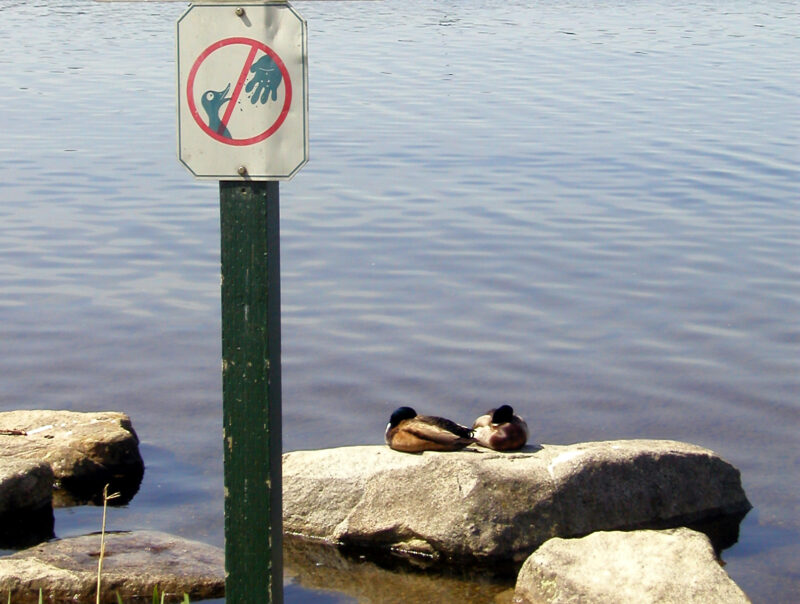
I don't know about you, but as a kid one of my favorite things to do was to go to the park to feed the ducks some stale bread. There is now a movement to educate people on the dangers of doing just that. Is this the fun police swooping in to ruin people's good times? Not really. Is a piece of bread going to kill a duck? No. But is it the best thing for them to be eating? Definitely not, especially for wild ducks.
Bread and other similar products like crackers, chips, & cereal are loaded with carbs and fat . Bread has very little in the way of the vitamins & minerals that a duck needs to be healthy. Bread is like junk food for them. It is tasty and fills them up, making them less likely to eat the food they need. Feeding your ducks too much bread will cause excessive weight gain and malnutrition from eating too many treats and too little feed pellets. Because it is so tasty, they tend to gobble it up very quickly which can lead to an impacted crop.
For your backyard ducks, if you want to indulge them infrequently with a bit of bread, ripped into tiny pieces it is not the end of the world. For wild ducks it is really not a good idea because you don't know how many other families have given them bread that day. Weight gain can be especially deadly for wild ducks, not just for health reasons, but because a fat duck may not be able to escape predators quick enough.
If you or your children love feeding wild ducks you could purchase some duck feed and keep it in a gallon size freezer bag in your car, a bag of dried meal worms (you can usually find these where birdseed is sold or at feed stores), or bring along a head of romaine lettuce rather than slices of bread 🙂
What do you feed your ducks? What is their favorite treats?
Source: https://thecapecoop.com/feeding-your-backyard-ducks/
0 Response to "Is This Suitible for Ducks Manna Pro Family Farm® Egg Maker 15 Layer Crumbles Chicken Feed"
Post a Comment